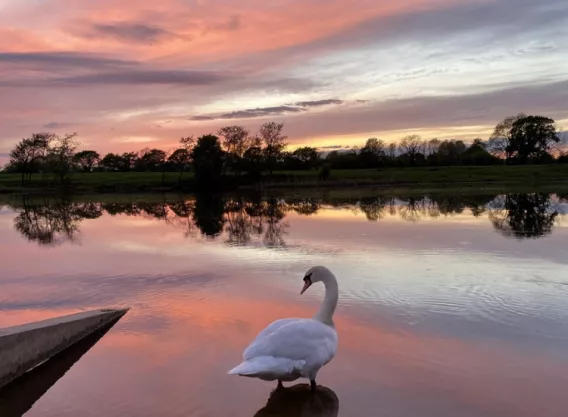
My name is Ellen and I completed both my undergraduate and master’s degrees in Psychology with the University of Limerick. The familiarity and beauty of the UL campus has been at the forefront of my most special memories over the past 5 years.
Back as a leaving cert student, after seeing UL’s campus for the first time with its open green spaces, excellent sports facilities, and welcoming atmosphere, I knew immediately that it was the place for me. Having always had a keen interest in sports - particularly athletics and middle-distance running, I was not only impressed by the UL sports arena and running tracks, but by the open outdoor spaces to run around the campus and down alongside the River Shannon.
Through the years of studying psychology, I learned so much about the different ways of managing mental health and well-being. One area that resonated with me in particular, was the link between nature and well-being. Over the past decade, the benefits of nature for people’s overall health and well-being is getting the recognition that it deserves. Some systematic reviews have concluded that exposure to nature is associated with improved mental well-being in comparison to indoor environments. Similarly, exposure to nature helps to reduce mental fatigue.
Both digital and authentic nature experiences are linked with enhanced attention, with the caveat that the evidence predicts stronger effects for real nature (Litleskare et al., 2020)
Students are prone to feelings of mental fatigue and stress, which is why it is so important to find ways to look after ourselves. We can often get caught up in a bubble of working towards deadlines, being on time for lectures and perfecting our time-management skills. Our own mental health and well-being can oftentimes take a back seat and we forget to appreciate the things that may otherwise seem insignificant - such as going out for a walk in nature. Having lived in Cappavilla Student accommodation for 2 years, the walk across the Living Bridge was a common feature in my daily routine, and I never tired of the beautiful scenery as I made my way to and from my lectures and the gym.
Green exercise, or physical exercise in natural green space, has many additional benefits beyond indoor training in terms of mental health, well-being, and of course carbon footprint (Donnelly & MacIntyre, 2019).


Being out in nature and green spaces encourages us to be more mindful and appreciative of our surroundings - which in turn can act as a distraction from our other stresses. UL provides a safe, natural environment that acts as a break from our busy lives – a place to go and relax, get some fresh air, exercise or simply have lunch outside with friends. UL’s campus has so much nature and greenery to offer its students; from Kilmurry ‘beach’ to the vast Maguire’s pitches, there is an abundance of green space right on the doorstep of the students and staff. One of my favourite areas in UL is the Living Bridge, which provides a winding walkway over the River Shannon, complemented by stunning scenery of the river and pathways.
A recent pan-European study has reported a positive association between greater exposure to outdoor blue spaces and mental health (Gascon et al., 2017).
This easy access to nature and green spaces encourages students and staff to take a step back from the otherwise hectic lifestyle of academia. I experienced first-hand the benefits that such a nature-dense campus can have on the well-being of students, and I am so grateful to have been able to call UL campus my second home over the past 5 years.

If studying in an environment surrounded by nature and open green-spaces sounds appealing to you, then why not check out UL's full range of courses here or have a look at the course that started Ellen's Journey - the BSc in Psychology at UL.
